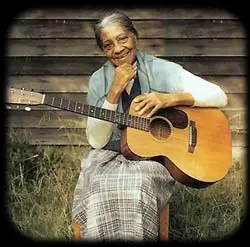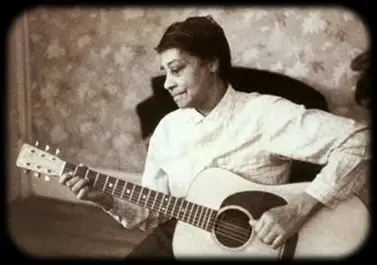ELIZABETH ‘LIBBA’ COTTEN

Not many Blues players have an instrumental style so unique that it carries their name. Libba Cotten's phenomenally accurate, but 'upside-down' Piedmont style with its alternating bass strings became known as 'Cotten-picking'.
Not too many write a worldwide hit song at the age of 12 either, but this is only part of the extraordinary story of Libba Cotten.
Just after the turn of the 19th century in Carrboro, Nth. Carolina, the 7 year-old Elizabeth Nevills used to play with her older brother's banjo.
Being left-handed she improvised by playing the normally-stringed instrument across her lap and working out the picking and chording for herself. Libba borrowed his guitar too and adapted her unorthodox style to the lack of a drone string, and at the age of 11 she had saved enough from her domestic work to buy her own guitar.
The following year she was kept awake by noise from the nearby railroad, and she was inspired to write her song 'Freight Train'.
The young Libba never performed outside her circle of family and friends, and for the next 45 years she only sang in Church.
On February 1910, when she was only just 15, Libba married Frank Cotten and they had a daughter Lillie. The family moved around the eastern States until they eventually settled in Washington DC. When Lillie got married, Libba divorced Frank.
Some time later she was working in a department store when she found a lost child. She returned the girl, Peggy, to her mother, Ruth Seeger, and soon afterwards she went to work for the family.

'Washington Blues' and 'Going Away' show Libba's astonishing skill;
Libba's extraordinary talent was obvious to everyone, and an album, 'Folksongs and Instrumentals' soon followed. 'Freight Train' was included in this collection and it was a No.5 hit in the UK pop Charts for Scottish singer Nancy Whiskey, and it sold well around the world.
This song has been covered by dozens of artists over the years, and its instant impact led to Libba, at the age of 62, being asked to perform in public concerts.
She was reluctant at first, but rose to the occasion and began to compose more original material. She appeared at many concerts and Festivals, sharing the stage with Muddy Waters, Mississippi John Hurt, Skip James and John Lee Hooker. It seems she never put her guitar down at this point and was known to finish a three-hour concert then go back to her hotel and play until dawn.
Recommended Album
Libba's unique style on guitar and banjo makes essential listening to fans of fingerpicking country Blues.
Charles Seeger, the composer and musicologist, had three sons by his first wife, the youngest being Pete, and on marrying musician Ruth Porter Crawford they had four more, Mike, Peggy, Barbara and Penny.
In this busy household Libba's musical skills lay undiscovered until she began playing little Peggy's guitar and Mike Seeger made some home recordings of Libba's music.
In 1965 a second album, 'Shake Sugaree', again produced by Mike Seeger, gave us another astonishing collection of Libba's work. She played country Blues on the banjo like nobody else and her finger-picking style was a revelation to a whole generation of folk and blues guitarists.
She was joined on this record by her grandchildren and soon, gathering her family around her, she moved to Syracuse NY, which became her base for the rest of her life.
A third collection, 'When I'm Gone', followed in 1979, and Libba continued to tour and record well into her 80s. In 1984 she won a Grammy for 'Elizabeth Cotten Live!'
Libba passed away in Syracuse in 1987, but her unique talents and her inspirational story led to her being included among 75 influential African-American women in the photo-documentary 'I Dream a World'.
Nobody could dream up a character like Libba Cotten.